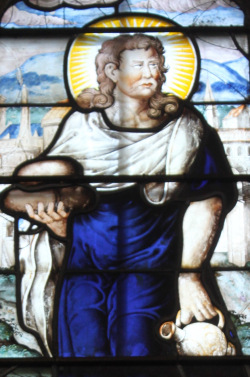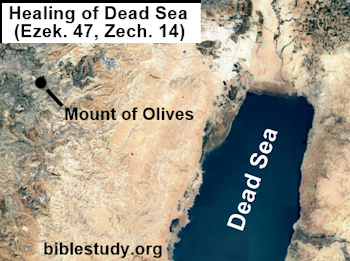[What Did Herod's Temple Look Like?]
Zechariah and Haggai are close temporaries. Haggai wrote in 520 B.C. while Zechariah recorded his work from 520 to 518.
Zechariah is mentioned in two Old Testament books he did not write. The name of the Minor Prophet is recorded in Nehemiah 12:1, 4 and 16 as well as Ezra 5:1 and 6:14.
The Lord of Hosts
The phrase "Lord of hosts" is recorded 53 times in 46 verses in Zechariah. This is an amazing number of times given the book only has 14 chapters! Only the much larger writings of Jeremiah (71 times) and Isaiah (54) have more occurrences.
Zechariah is also unique in that it contains the only Bible verse that repeats "Lord of hosts" three times in the King James!
[What Are God's Different Names?]
Therefore say thou unto them, Thus saith the LORD of hosts; Turn ye unto me, saith the LORD of hosts, and I will turn unto you, saith the LORD of hosts (Zechariah 1:3).
How Big Was It?
The Medo-Persian Empire (Zechariah 1:1) was the second world power revealed by Nebuchadnezzar's dream of a giant man (Daniel 2:32, 39, 7:5). Though second, it ended up being the biggest and most powerful of the ancient empires!

The Persian Empire, at its height, controlled 2.9 million square miles (7.51 million square kilometers) of territory. The Roman Empire at its peak, under Trajan, controlled 2.2 million square miles (5.7 million square kilometers) while Alexander the Great's empire spanned 2.08 million square miles (5.38 million square kilometers).
[List of History's Greatest Empires]
What Did the Second Temple Lack?
Zechariah makes several references to people and things related to Jerusalem's temple (Zechariah 3:1 - 7, 4:8 - 10, 6:9 - 15, etc.). According to Jewish tradition, the second temple was inferior to the first because it lacked five things.
The second temple did not have the Ark of the Covenant which contained God's law, Aaron's rod that budded and a golden pot of manna (bread from heaven) (Hebrews 9:3 - 4). It also lacked the Urim and Thummim, carried around by the High Priest, which was used to convey God's will to his people (Exodus 28:30, Leviticus 8:8).
The third thing the second temple lacked, according to tradition, was the sacred fire (Leviticus 6:13) which was to continually burn under the altar. The Shekinah or presence of God, as well as the spirit of prophecy, was also lacking.
Interestingly, the only place in the KJV Bible where the phrase "spirit of prophecy" is recorded is in the book of Revelation!
[How Can We Understand Prophecy?]
And I fell at his feet to worship him. And he said unto me, See thou do it not: I am thy fellowservant, and of thy brethren that have the testimony of Jesus: worship God: for the testimony of Jesus is the spirit of prophecy (Revelation 19:10).
Healing the Dead Sea
Zechariah reveals the fascinating detail that upon Jesus' return to the Mount of Olives (see Acts 1:11) he will cause it to split in two. The split will form a large valley that will run both east and west (Zechariah 14:4). The prophet later states that a constant flow of "living waters" will then travel east to the "former sea" (the Dead Sea) and west to the "hinder sea" (Mediterranean) (verse 8).

What, if any, effects will the above miraculous waters have on the land of Israel?
Ezekiel, in a vision, sees a river flowing eastward from God's temple (Ezekiel 47:1). The river flows east until it reaches the Dead Sea where it will then heal it!
These waters issue out toward the east country, and go down into the desert, and go into the sea: which being brought forth into the sea, the waters shall be healed (Ezekiel 47:8).
The Dead Sea, in its present state, contains water that is roughly ten times saltier than the ocean! Its harsh environment means that plants and animals (including fish) cannot live within or even near it. It is also swiftly receding, having lost 176 square miles (445 square kilometers) of surface area since 1930. The Dead Sea is certainly in need of healing!
[The BEST Verses About Healing!]
Ezekiel's vision continues by stating ever place the living waters goes it will bring life including an abundance of fish (Ezekiel 47:9). This healing liquid, when it reaches the Dead Sea, will cause its waters to become fresh and support fish. The abundance of such life will reach a point, amazingly, where even commercial fishing will be able to be carried out!
And it shall come to pass, that the fishers shall stand upon it from Engedi (a city on the western side of the Dead Sea) even unto Eneglaim; they shall be a place to spread forth nets; their fish shall be according to their kinds, as the fish of the great sea, exceeding many (Ezekiel 47:10).
A Most Common Name!
There are at least twenty-nine Biblical individuals named Zechariah or its variations such as Zachariah or Zacharias in the King James Bible! The name Zechariah is found 39 times in Scripture, with Zachariah used four times and Zacharias written 11 times.
The most important Zechariah was the son of Jeroboam II who reigned over Israel for only six months in 753 B.C. Zechariah was, of course, the name of an Old Testament Minor Prophet.
Other well-known Zechariahs include one who condemned rebellion against God, at the time of King Joash, and paid with his life (2Chronicles 24:20, Matthew 23:35). Others include a Levite who assisted transporting the Ark of the Covenant (1Chronicles 15:20 - 24), a son of Asaph (2Chronicles 29:13), a chief of the tribe of Reuben (1Chronicles 5:7) and one of King Jehoshaphat's sons (2Chronicles 21:2).
Feast of Joy!
The Feast of Tabernacles (Booths), the sixth of God's seven annual festival periods, is celebrated for seven days each fall (Tishri 15 to 21 which occurs between September and October). Zechariah 14 is one of the few major passages in the Bible that discusses this joyous time of the year! The other passages are Leviticus 23, Deuteronomy 16 and John 7.